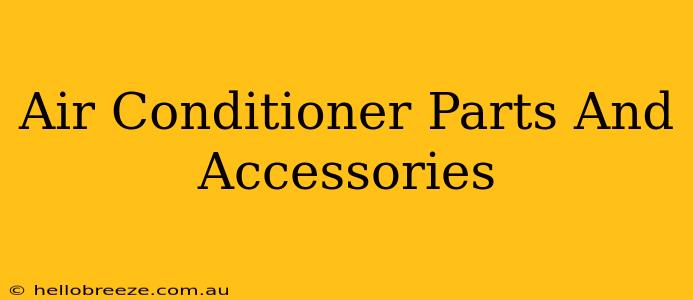Finding the right air conditioner parts and accessories can be tricky. This comprehensive guide will walk you through everything you need to know, from identifying common parts to understanding where to find high-quality replacements. Whether you're a DIY enthusiast or need help troubleshooting your AC unit, this guide is your ultimate resource.
Understanding Your Air Conditioner's Components
Before diving into specific parts and accessories, it's crucial to understand the basic components of a typical air conditioning system. This will help you identify the specific part you need when something goes wrong.
Key Components:
- Compressor: The heart of your AC unit, responsible for circulating refrigerant. Compressor issues are often a major cause of AC failure.
- Condenser Coil: Located outside, this coil releases heat from the refrigerant. Dirty condenser coils significantly reduce efficiency.
- Evaporator Coil: Located inside, this coil absorbs heat from your home. Frozen evaporator coils are a common problem.
- Refrigerant Lines: These tubes carry refrigerant between the condenser and evaporator coils. Leaks in these lines can lead to poor cooling.
- Expansion Valve/Capillary Tube: This component regulates the flow of refrigerant. Malfunctioning expansion valves can cause various problems.
- Blower Motor: This motor circulates air over the evaporator coil. A faulty blower motor will result in weak airflow.
- Air Filter: This crucial component traps dust and debris, preventing them from clogging the coils and reducing efficiency. Regular replacement is essential.
Common Air Conditioner Parts and Accessories You Might Need:
Here's a breakdown of commonly needed replacement parts and helpful accessories:
1. Air Filters:
Importance: Replacing your air filter regularly is crucial for maintaining efficient cooling and extending the life of your AC unit. A clogged filter restricts airflow, forcing the system to work harder and potentially leading to premature failure.
Types: Various types are available, including pleated filters (most common), electrostatic filters (better at trapping smaller particles), and HEPA filters (for superior air purification). Choose a filter with the correct size for your unit.
2. Refrigerant:
Caution: Handling refrigerant requires specific knowledge and safety precautions. Unless you're a trained HVAC technician, do not attempt to recharge your AC unit yourself. Improper handling can be dangerous. Contact a professional for refrigerant recharging.
3. Blower Motor and Capacitor:
Troubleshooting: A weak or non-functioning blower motor often manifests as weak airflow. A faulty capacitor can prevent the motor from starting. These components usually require professional replacement.
4. Condenser Fan Motor and Blade:
Outside Unit Maintenance: The condenser fan motor and blade circulate air around the outdoor condenser coil. A malfunctioning fan can significantly reduce cooling efficiency.
5. Control Board:
Advanced Component: The control board is the "brain" of your AC unit. Replacing a control board is typically a task best left to HVAC professionals due to its complexity.
6. Refrigerant Lines and Fittings:
Leak Repair: Leaks in refrigerant lines require professional attention and repair using specialized tools and techniques.
Finding Quality Air Conditioner Parts and Accessories:
Several sources offer air conditioner parts and accessories:
- HVAC Supply Houses: These specialized stores offer a wide selection of parts and accessories.
- Online Retailers: Major online retailers often carry a wide range of parts for various AC brands and models. Always verify compatibility before purchasing.
- Local Appliance Repair Shops: Many repair shops also sell parts and accessories. They can provide expert advice on selecting the correct parts.
Pro Tip: When ordering parts online or from a retailer, always have your AC unit's model number handy for accurate identification.
Maintaining Your Air Conditioner for Optimal Performance
Regular maintenance is key to extending the lifespan of your AC unit and ensuring optimal performance. This includes:
- Regular filter changes: Change filters every 1-3 months, or as recommended by the manufacturer.
- Coil cleaning: Clean condenser and evaporator coils annually to remove dust and debris.
- Professional inspection: Schedule an annual inspection by a qualified HVAC technician.
By understanding your air conditioner's components, knowing where to find quality parts, and implementing regular maintenance, you can keep your AC unit running smoothly and efficiently for years to come. Remember, safety is paramount, so don't hesitate to call a professional for complex repairs or if you are unsure about any aspect of maintenance or repair.

